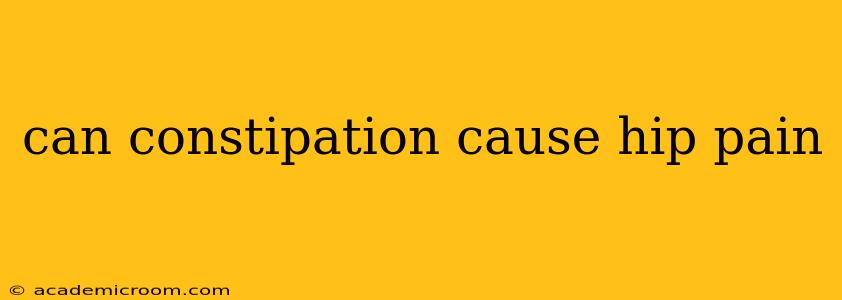Constipation, characterized by infrequent or difficult bowel movements, can indeed contribute to hip pain, though it's not a direct cause in the way a fracture or arthritis might be. The connection is indirect and often involves the interplay of several factors. This article will explore this relationship, answering common questions surrounding this often-overlooked link.
How Can Constipation Lead to Hip Pain?
The primary mechanism by which constipation might cause hip pain involves increased pressure and strain on the pelvic floor muscles. When stool becomes hard and compacted, it requires more forceful straining during bowel movements. This increased pressure impacts the surrounding muscles and structures, potentially causing pain that can radiate to the hips.
Several factors contribute to this pain:
-
Pelvic Floor Muscle Strain: Repeated straining can lead to overexertion and inflammation of the pelvic floor muscles. These muscles are closely connected to the hip joints and can refer pain to this area. Think of it like a muscle pull, but in a less obvious location.
-
Sacroiliac Joint Dysfunction: The sacroiliac (SI) joints connect the sacrum (the triangular bone at the base of the spine) to the pelvis. Increased pressure from straining during constipation can affect these joints, leading to inflammation and pain radiating to the hips and lower back.
-
Nerve Irritation: The nerves in the pelvic region are sensitive. The pressure from a large, impacted stool can irritate these nerves, resulting in referred pain, often felt in the hips and buttocks.
-
Muscle Spasms: The intense effort required to pass hard stools can trigger muscle spasms in the abdomen, hips, and buttocks, leading to significant discomfort.
What are the Symptoms of Constipation-Related Hip Pain?
Differentiating between hip pain solely caused by constipation and pain stemming from other sources can be challenging. However, certain accompanying symptoms might suggest a connection:
- Difficulty passing stool: This is the hallmark of constipation.
- Abdominal bloating and discomfort: A feeling of fullness and pressure in the abdomen.
- Hard, dry stools: The consistency of the stool is a key indicator.
- Pain that improves after a bowel movement: This is a strong indicator of a link between constipation and hip pain.
- Pain in the lower back and buttocks: Pain may radiate from the pelvis to these areas.
It's crucial to remember that these symptoms can also be indicative of other conditions. Therefore, self-diagnosis should be avoided.
Does Relieving Constipation Relieve Hip Pain?
In many cases, yes. Successfully alleviating constipation often leads to a significant reduction in hip pain. This reinforces the connection between the two. Methods for relieving constipation include:
- Increased fiber intake: Adding more fiber-rich foods to your diet helps soften the stool and promotes regularity.
- Increased fluid intake: Drinking plenty of water helps soften the stool.
- Regular exercise: Physical activity stimulates bowel movements.
- Over-the-counter laxatives: These can provide short-term relief, but long-term use should be discussed with a doctor.
When Should I See a Doctor About Hip Pain and Constipation?
While constipation often resolves with lifestyle changes, it's important to consult a healthcare professional if:
- Your hip pain is severe or persistent.
- You experience changes in bowel habits that persist for several weeks.
- You have blood in your stool.
- You experience weight loss, unexplained fatigue, or other systemic symptoms.
A doctor can help determine the underlying cause of your hip pain and recommend the appropriate treatment.
Can Other Conditions Mimic Constipation-Related Hip Pain?
Many conditions can cause hip pain, making it crucial to see a doctor for proper diagnosis. These include:
- Osteoarthritis: A degenerative joint disease affecting the cartilage in the hip joint.
- Bursitis: Inflammation of the bursae (fluid-filled sacs) around the hip joint.
- Tendinitis: Inflammation of the tendons in the hip.
- Hip fractures: A break in the bone of the hip.
- Sciatica: Pain radiating down the leg due to nerve compression.
In conclusion, while constipation itself doesn't directly cause hip pain, the increased strain and pressure on the pelvic floor muscles and surrounding structures can indeed contribute to it. Paying attention to your bowel habits and seeking medical advice when necessary are essential for managing both constipation and associated hip pain effectively. Remember to consult a healthcare professional for a proper diagnosis and treatment plan.
